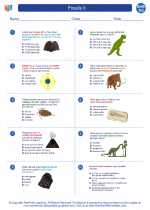Fossils II -> marine
Marine
Marine refers to anything related to the sea or ocean. It encompasses various aspects including marine biology, oceanography, marine ecology, and marine geology. Studying marine environments is crucial for understanding the Earth's interconnected systems, including the water cycle, climate, and biodiversity.
Study Guide:
1. Marine Biology
Marine biology is the study of organisms that live in the ocean. This includes the study of marine plants, animals, and microorganisms, their behaviors, and their interactions with the marine environment. It also involves understanding the adaptations of marine organisms to their aquatic habitat.
2. Oceanography
Oceanography is the scientific study of the ocean and its phenomena. It includes the physical and chemical properties of the ocean, the movement of ocean currents, the distribution of marine life, and the geology of the ocean floor. It also involves the study of waves, tides, and the interaction between the ocean and the atmosphere.
3. Marine Ecology
Marine ecology focuses on the relationships and interactions between marine organisms and their environment. It explores topics such as marine food webs, nutrient cycling, and the impact of human activities on marine ecosystems. Understanding marine ecology is essential for the conservation and management of marine resources.
4. Marine Geology
Marine geology is the study of the geologic processes and history of the ocean floor. It involves the investigation of seafloor topography, the formation of ocean basins, the movement of tectonic plates, and the distribution of sediments on the seafloor. Marine geology also plays a crucial role in understanding past climate change and the evolution of marine environments.
Studying the marine environment is not only fascinating but also essential for addressing environmental challenges and sustaining marine ecosystems for future generations.



